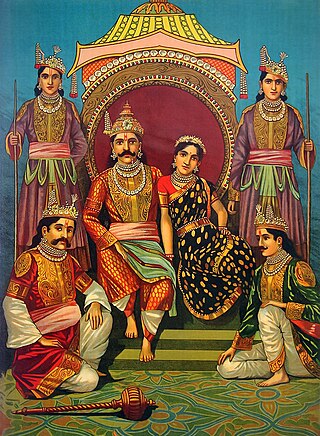Related Research Articles
Marriage, also called matrimony or wedlock, is a culturally and often legally recognised union between people called spouses. It establishes rights and obligations between them, as well as between them and their children, and between them and their in-laws. It is nearly a cultural universal, but the definition of marriage varies between cultures and religions, and over time. Typically, it is an institution in which interpersonal relationships, usually sexual, are acknowledged or sanctioned. In some cultures, marriage is recommended or considered to be compulsory before pursuing sexual activity. A marriage ceremony is called a wedding, while a private marriage is sometimes called an elopement.

Polygyny is a form of polygamy entailing the marriage of a man to several women. The term polygyny is from Neoclassical Greek πολυγυνία (polugunía); from Ancient Greek πολύ (polú) 'many', and γυνή (gunḗ) 'woman, wife'.

Polyandry is a form of polygamy in which a woman takes two or more husbands at the same time. Polyandry is contrasted with polygyny, involving one male and two or more females. If a marriage involves a plural number of "husbands and wives" participants of each gender, then it can be called polygamy, group or conjoint marriage. In its broadest use, polyandry refers to sexual relations with multiple males within or without marriage.
Polygamy is the practice of marrying multiple spouses. When a man is married to more than one wife at the same time, it is called polygyny. When a woman is married to more than one husband at the same time, it is called polyandry. In sociobiology and zoology, researchers use polygamy in a broad sense to mean any form of multiple mating.

In a culture where only monogamous relationships are legally recognized, bigamy is the act of entering into a marriage with one person while still legally married to another. A legal or de facto separation of the couple does not alter their marital status as married persons. In the case of a person in the process of divorcing their spouse, that person is taken to be legally married until such time as the divorce becomes final or absolute under the law of the relevant jurisdiction. Bigamy laws do not apply to couples in a de facto or cohabitation relationship, or that enter such relationships when one is legally married. If the prior marriage is for any reason void, the couple is not married, and hence each party is free to marry another without falling foul of the bigamy laws.
Group marriage or conjoint marriage is a marital arrangement where three or more adults enter into sexual, affective, romantic, or otherwise intimate short- or long-term partnerships, and share in any combination of finances, residences, care or kin work. Group marriage is considered a form of polygamy. While academic usage has traditionally treated group marriage as a marital arrangement, more recent usage has expanded the concept to allow for the inclusion of non-conjugal unions. Colloquial usage of group marriage has also been associated with polyamory and polyamorous families.
Conflict of marriage laws is the conflict of laws with respect to marriage in different jurisdictions. When marriage-related issues arise between couples with diverse backgrounds, questions as to which legal systems and norms should be applied to the relationship naturally follow with various potentially applicable systems frequently conflicting with one another.
The type, functions, and characteristics of marriage vary from culture to culture, and can change over time. In general there are two types: civil marriage and religious marriage, and typically marriages employ a combination of both. Marriages between people of differing religions are called interfaith marriages, while marital conversion, a more controversial concept than interfaith marriage, refers to the religious conversion of one partner to the other's religion for sake of satisfying a religious requirement.
Polygamy is the practice of having more than one spouse at the same time. Specifically, polygyny is the practice of one man taking more than one wife while polyandry is the practice of one woman taking more than one husband. Polygamy is a common marriage pattern in some parts of the world. In North America, polygamy has not been a culturally normative or legally recognized institution since the continent's colonization by Europeans.

Economic development in the country of Bhutan has increased opportunities for women to participate in fields such as medicine, teaching, and administration. Women were providing more labor than men in all sectors of the economy. Less than 4 percent of the total female work force was unemployed, compared with nearly 10 percent of men who had no occupation. In particular, nearly 10 percent of government employees were women by 1989. During their government careers, women civil servants were allowed three months of maternity leave with full pay for three deliveries and leave without pay for any additional deliveries.
Polygamy is "the practice or custom of having more than one wife or husband at the same time." Polygamy has been practiced by many cultures throughout history.

Polygamy, including polygyny, is outlawed in India. While it was not prohibited in Ancient India and was common among aristocrats and emperors, it is believed that it was not a major cultural practice. The lack of prohibition was in part due to the separation between land laws and religion, and partially since all of the major religions of India portrayed polygamy in a neutral light.

Under civil law, Nigeria does not recognize polygamous unions. However, 12 out of the 36 Nigerian states recognize polygamous marriages as being equivalent to monogamous marriages. All twelve states are governed by Sharia law. The states, which are all northern, include the states of Bauchi, Borno, Gombe, Jigawa, Kaduna, Kano, Katsina, Kebbi, Niger, Sokoto, Yobe, and Zamfara which allows for a man to take more than one wife.

Polyandry in India refers to the practice of polyandry, whereby a woman has two or more husbands at the same time, either historically on the Indian subcontinent or currently in the country of India. An early example can be found in the Hindu epic Mahabharata, in which Draupadi, daughter of the king of Panchala, is married to five brothers.
Polygamy is legal under certain circumstances in South Africa. All polygamous marriages entered into in accordance with the provisions of the Recognition of Customary Marriages Act are legal. The husband in an existing customary marriage wishing to marry a second wife must apply to a competent court for such a marriage to be legal. Hence former President Jacob Zuma currently has four legally-recognised wives. The court considers the interests of all parties to the marriage and may add whatever conditions the court deems just for the polygamous marriage to be valid under customary law. Polygamous marriages are not allowed under the Marriage Act and the Civil Unions Act.
The legal status of polygamy varies widely around the world. Polygyny is legal in 58 out of nearly 200 sovereign states, the vast majority of them being Muslim-majority countries. Some countries that permit polygamy have restrictions, such as requiring the first wife to give her consent.
Polygamy is the practice of having more than one spouse; while prohibited under Zimbabwean civil law, polygamous marriages may be performed under the country's customary law. Less than one-fifth of the country's population are engaged in polygamy.
Polygamy is illegal in Ghana, but the restrictions are not heavily enforced. Polygamous marriages are illegal under civil law, though are arguably considered to be legal under customary law. Despite these exceptions, there have been no reports of a legally contracted polygamous marriage in Ghana; and are considered to be "de facto" illegal. An estimated 22% of Ghanaian women live polygamously.

Polygamous marriages may not be performed in New Zealand. A married person who enters into another marriage in New Zealand is guilty of the crime of bigamy. Similar rules apply for civil unions, which have been legal in New Zealand since 2005. However, polygamous marriages legally performed in another country have limited recognition in New Zealand law, provided that no person involved was living in New Zealand at the time of the union.
Polygamy is the practice of having more than one spouse at the same time. Specifically, polygyny is the practice of one man taking more than one wife while polyandry is the practice of one woman taking more than one husband. Polygamy is legal in Malaysia in the form of polygyny, that is, between one man and up to four wives. Special permission from an individual state's Syariah Court is required for each marriage after the first by fulfilling the requirements needed by the state's Syariah Law.
References
- ↑ "Marriage Act of Bhutan 1980" (PDF). Government of Bhutan. 1980. Retrieved 2011-03-29.
- ↑ "Bhutan's royal wedding points to end of polygamy". 16 October 2011.
- ↑ "The Disappearing Practice of Polyandry". New Bhutan Times. Archived from the original on 2 January 2018.
- ↑ "The custom of more than one spouse with Brokpas (The people of Merak)". www.windhorsetours.com. October 10, 2007.